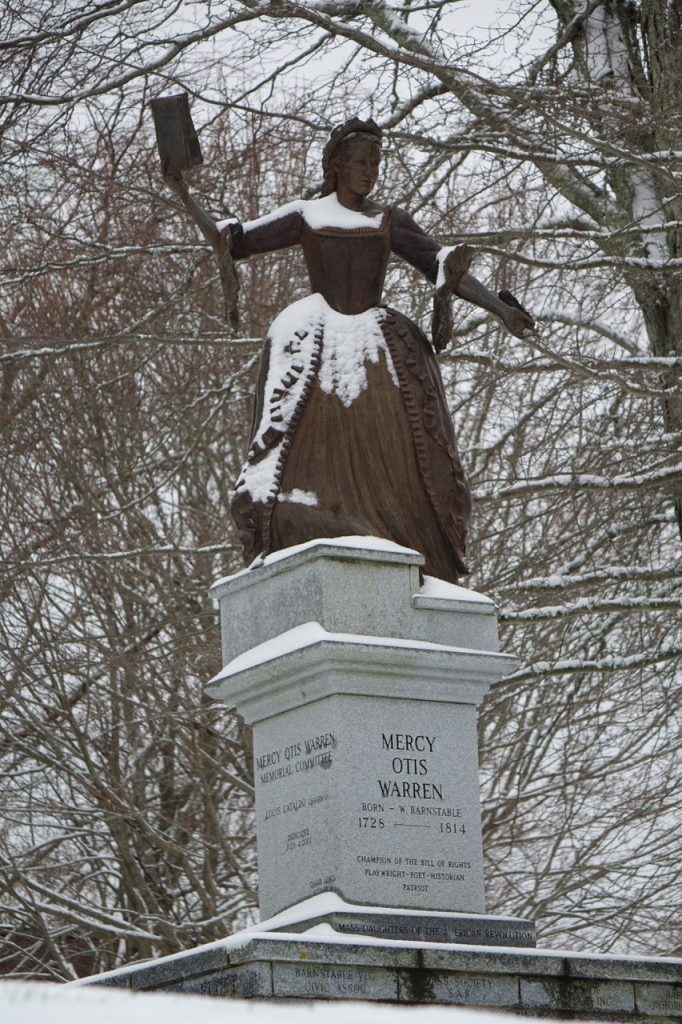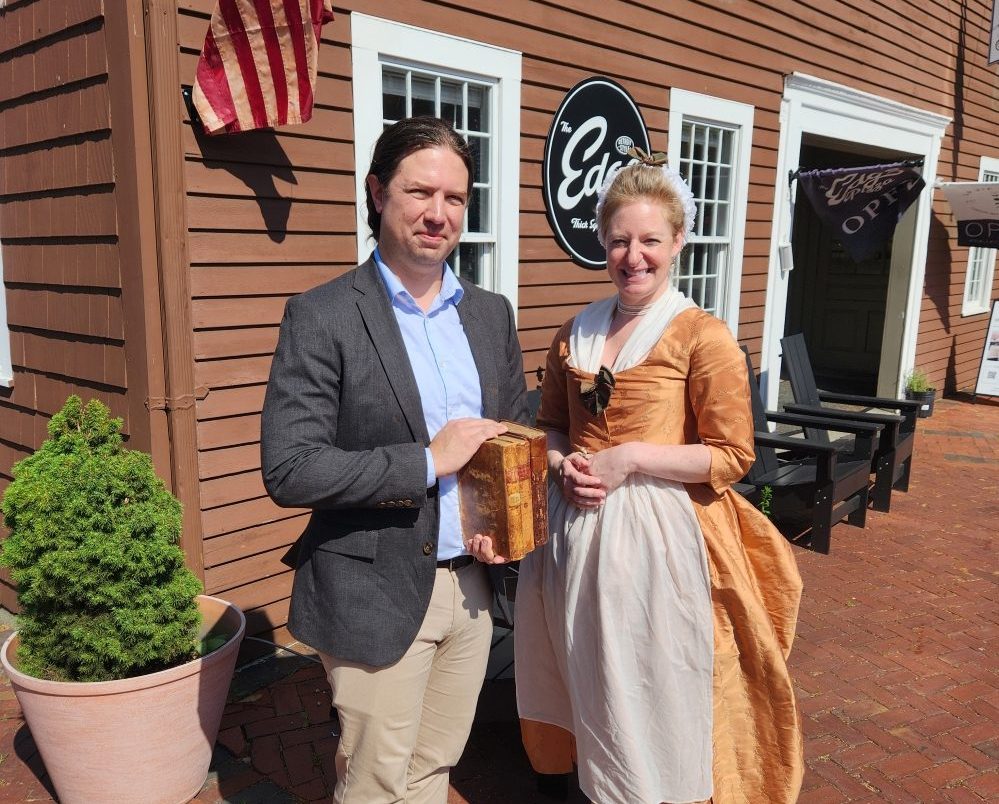It doesn’t take long for a crowd to gather around Sean Considine and Michele Gabrielson as they stand in downtown’s Shirley Square. Though dressed in modern clothing, Considine has his long hair pulled back in a neat ponytail, resembling the style worn by a proud 18th-century British army captain, which he portrays as a Revolutionary War reenactor.
By his side is Gabrielson, who is dressed for the occasion on this blistering summer day. Looking very much the part of a colonial woman, her head is covered by a ruffled linen cap, and she is wearing a long, flowing dress with a tight-fitting bodice. With the sun bearing down on Shirley Square, a passerby asks if she hot.
“No,” she smiles pleasantly. “I’m actually comfortable.”
While out-of-state visitors gawk, they are missing the real star of the moment: the books in Considine’s hands. They are the three volumes of Mercy Otis Warren’s “History of the Rise, Progress, and Termination of the American Revolution,” published in 1805. The first-edition set is on a reunion tour, of sorts. The building behind Considine and Gabrielson now houses the Edge pizza restaurant and offices, but it was once the home of Warren and the place where she likely penned much her seminal series about the War for Independence.
“Her sitting room was on the second floor, which is where Mercy did most of her writing,” says Gabrielson, who is secretary of the Mercy Otis Warren Society and as a reenactor portrays the woman called “the conscience of the Revolution” by fellow patriot and friend John Adams.
The books weren’t in Plymouth for just a social visit, though. Considine brought his three volumes to town for a July 11 ceremony, where he presented them as a permanent loan to the society, which is trying to promote awareness of Warren and her role in the cause of liberty. They will be displayed at events and will be made available to scholars studying the contributions of this revolutionary woman.
“Mercy was a no-holds-barred patriot,” Considine says. “She did not hold back against people who were not faithful to the Republican values that she held so dear. She used her powerful voice as a writer to state her opinions with grace and reason.”

Born in Barnstable in 1728, Mercy moved to Plymouth when she married James Warren in 1754. She was raised in a family that supported revolutionary ideals and found a life partner who shared her beliefs. Warren’s husband was a Plymouth merchant, state politician and general in the Massachusetts militia during the Revolutionary War.
In the leadup to hostilities with Great Britain, Mercy Otis Warren wrote scores of plays, poems and pamphlets urging colonists to act “to rescue and save their civil and religious rights from the outstretched arm of tyranny.” In addition to Adams and his wife Abigail, she was friends with John Hancock, Thomas Jefferson, George Washington, Samuel Adams, and other leading figures invested in the cause of liberty.
In 1805, Warren published the first history of the American Revolution in the United States. She wrote about the rebellion by researching original documents and manuscripts, interviewing key participants and from her own memory of having lived through the tumultuous time.
“With these books, Mercy Otis Warren goes from being a political commentator to a historian in her own right,” Considine says. “She was highly regarded at the time for her work, but few people remember her today.”
In addition to being a reenactor, Considine collects first-edition books. Earlier this year, he was online looking for rare editions when he came across a listing for volumes one and three of Warren’s history of the American Revolution. He contacted a friend and was told the chances of locating a first-edition copy of the remaining book were slim to none.
“I went to bed that night and couldn’t sleep,” he recalls. “I decided then that I would buy the books if they were still available in the morning, which they were. Later that day, I was online again, and I found a listing for volume two. What a good stroke of fortune!”
A complete set of “History of the Rise, Progress, and Termination of the American Revolution” – only 1,500 sets were originally published in 1805 – sells from $5,000 to $12,000, depending upon condition. Considine isn’t telling what he paid but it was considerably less since it was piecemeal.
Once he had all three volumes, Considine was faced with a dilemma: what to do with them? Should he hold on to them or resell them as a complete set? He decided donating the books was what Mercy would have wanted.
“I wanted to do a permanent loan so people could see them, touch them and smell them,” Considine says. “This is the first history of our country written by a woman who lived it.”
Members of the Mercy Otis Warren Society are thrilled to have the first edition set in its collection. They are hoping it will focus valuable attention on a remarkable woman who is all but forgotten in Plymouth today and help with the movement to have a memorial erected locally to honor her role in the American Revolution.
“A statue stands in Barnstable honoring her birthplace, but we have nothing in Plymouth,” Gabrielson says. “Mercy was one of our founding mothers. She was inquisitive, passionate and a vocal ambassador of the Republic. We need to do something here to honor her memory.”
Dave Kindy, a self-described history geek, is a longtime Plymouth resident who writes for the Washington Post, Boston Globe, National Geographic, Smithsonian and other publications. He can be reached at davidkindy1832@gmail.com.

